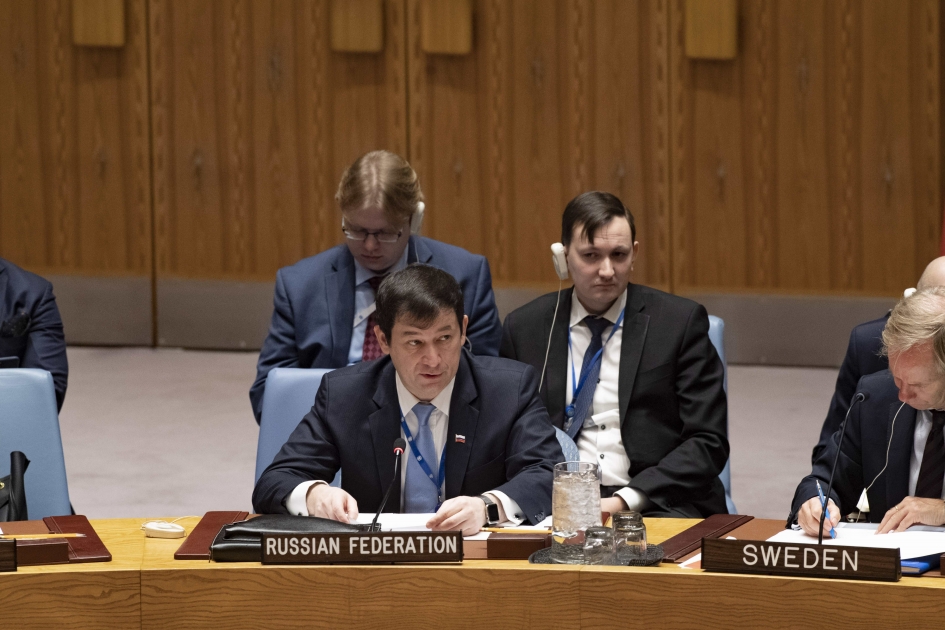Statement by Mr.Dmitry Polyanskiy, First Deputy Permanent Representative of the Russian Federation to the United Nations, at the Security Council on the situation in Central Africa
We thank Mr. François Louncény Fall, Special Representative of the Secretary-General, and Ms. Reena Ghelani for their information on the situation in the Central African subregion.
We firmly believe that the approach that is fundamental to effective crisis prevention and conflict resolution in Africa is one that combines a leading role for the African people themselves with support for their efforts on the part of the international community. In that connection, we welcome the efforts by the countries of Central Africa to counter the threats and challenges that they face, including through the joint programmes and initiatives to combat Boko Haram and ensure maritime security. Those efforts unquestionably need additional international support.
In that context, we note the activities of the United Nations Regional Office for Central Africa in strengthening peace and security in the region, as well as Special Representative Fall’s personal good offices. It is important to continue to expand our engagement with regional stakeholders, including the Economic Community of Central African States.
We concur with the assessment in the Secretary-General’s report (S/2018/1065) that Central Africa is dealing with a huge number of challenges on the security, political and economic fronts. Boko Haram’s terrorist activity remains one of the chief threats to regional peace and stability and also brings with it serious humanitarian consequences, particularly in the Lake Chad basin region. In that context, we must not lose sight of the fact that the destabilization in the region assumed catastrophic proportions in the wake of the collapse of statehood in neighbouring Libya. The situation in Libya is still far from normalized and continues to have negative repercussions for the situation in the region in general.
We welcome the efforts undertaken by Africans themselves to eradicate the terrorist threat, and we hope that the Joint Force of the Group of Five for the Sahel can make a meaningful contribution to stabilizing the security situation in the subregion. The situation in the Central African Republic is very worrying. Armed groups have engaged in brutal clashes over resources and territory.
We support President Touadera’s efforts to hold an inclusive political dialogue, work quickly to reform the security sector and improve the armed forces’ capacity. For our part, we will continue to fully support the country’s nascent national reconciliation, acting in coordination with the authorities in Bangui and with the African Union and the leadership of the Sudan, as well as with other stakeholders seeking ways to normalize the situation there.
One of the other factors behind the instability in the Central Africa is piracy in the Gulf of Guinea. In the light of the unceasing attacks on vessels along the coast of Somalia, a dangerous trend is emerging. We must not forget the importance of a comprehensive approach to combating piracy. We hope that with the support of the international community the pan-regional efforts will help to solve the problem of piracy in an area as economically important as the Gulf of Guinea.
We note that the destructive capacity of the Lord’s Resistance Army has shrunk considerably in the past few years. Its numbers have fallen and its activity is limited to sparsely populated areas in the Central African Republic and the Democratic Republic of the Congo. We believe that it should no longer be seen as a significant threat to peace and security in the region.
Like my colleagues, I would like to briefly touch on Cameroon. We are monitoring developments there closely. The information we have is troubling but so far extremely contradictory and not something that we should base any hasty or far-reaching decisions on. We understand the concerns of our British and American colleagues about the information on violations of the rights of the English-speaking population. I have to say that I can only hope that London and Washington will display an equally principled attitude to the infringements on the rights of the Russian-speaking population that are happening right under our colleagues’ noses in the Baltic States and Ukraine. With respect to Cameroon, it is important not to cross the line between prevention and intervention in States’ internal affairs.
There is every evidence that a number of our colleagues have come very close to that. For the time being we have every reason to believe that Cameroon is capable of dealing with this tricky issue by itself. We are willing to help, but only if our partners in Cameroon deem it necessary. At this stage, we urge all the parties in Cameroon to refrain from violence and focus on substantive national dialogue.
In conclusion, I would like to point out that the threats and challenges that the Central African region is dealing with today are closely entwined and interrelated, while the States themselves are highly dependent on one another. The destabilization of the situation in one country is liable to ignite the entire subregion, shattering the security of its neighbours. It is therefore exceedingly important to keep a finger on the pulse of evolving events, for which the activity of the United Nations Regional Office for Central Africa is useful.
